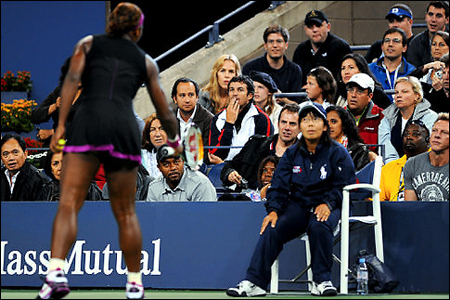- Set the Expectation. Most people don’t expect their opponent to call footfaults. If you plan on calling footfaults, let your opponent(s) know before the match starts. For example, I played in a tournament where the umpire called everyone together before we were sent out to our courts. (She actually did this before every round, not just the first round). She let us know that her main job at the tournament was calling footfaults. Because everyone knew what to expect beforehand, there weren’t any arguments about footfaults (that I was aware of).
- Call Footfaults from the start of the match. What I often see happening is that people call a footfault for the first time late in a set even though their opponent has been footfaulting the entire match. This unfair. If you are going to let footfaults slide most of the match, don’t start calling them on key points. It smacks of gamesmanship.
- Call Footfaults on Everyone. I often hear people say that they only call footfaults on “big servers”. The rationale being, that big servers get an advantage from footfaulting (but others don’t?). This is unfair. If your concern is with footfaulting, it doesn’t matter how good of a server your opponent is. Weak servers footfault just as much as good servers. Footfaulting is about stepping on or over the line. Not about how good of serve your opponent has. You can’t discriminate and only call footfaults on opponents whose serve is giving you problems. Either call it on everyone, or don’t call it at all. If you only call it on “big servers”, it seems pretty clear what your real motive is.
- Footfaulting isn’t a Moral Issue. A footfault is just a service fault. When you call a footfault, don’t try to imply that your opponent is cheating (or is in some way morally inferior). I’m sure you don’t “moralize” to opponents when you call their serve long. As if they’ve done something wrong. So don’t do it on footfaults either.
- Footfaulting is Just Another Call. Don’t stop play to explain your footfault call to your opponent. Just call it and get ready to receive the next serve. Just like you’d do if called their serve long. It’s really unfair to make the server listen to you “sermonize”. Especially if it’s between their first and second serve.
- Don't call a Footfault only on opponents good serves. You need to call footfaults on all serves where your opponent footfaults. Not just on their good serves (ace, unreturnable or weak return). You also can't decide to call a footfault after you miss a return.
- You might offer to play a let on the first few footfault calls. This obviously isn't required by the rules, but if your intent is to maintain goodwill and keep the match friendly, you might consider playing a let on the first few footfaults you call. Let your opponent know that you aren't out to get them. That you want to give them a chance to make adjustments early in the match, so the footfault call doesn't become "critical" late in a match in a big point. Just be sure to let your opponent know when you are going to stop playing a let and you are going to call a fault on the next footfault.
Having said this, if your real motive is to use the footfault call as a gamesmanship tactic, then simply do the opposite of everything I’ve suggested above. Try to provoke your opponent as much as possible. It’s a great way to make your opponent so angry they lose focus on the match. It’s also a great way to disrupt the rhythm of a match. Just make sure you keep repeating that you are “just following the rules”. Also be sure to imply as often as possible that your opponent is a cheater.
Good luck!
Last edited:


